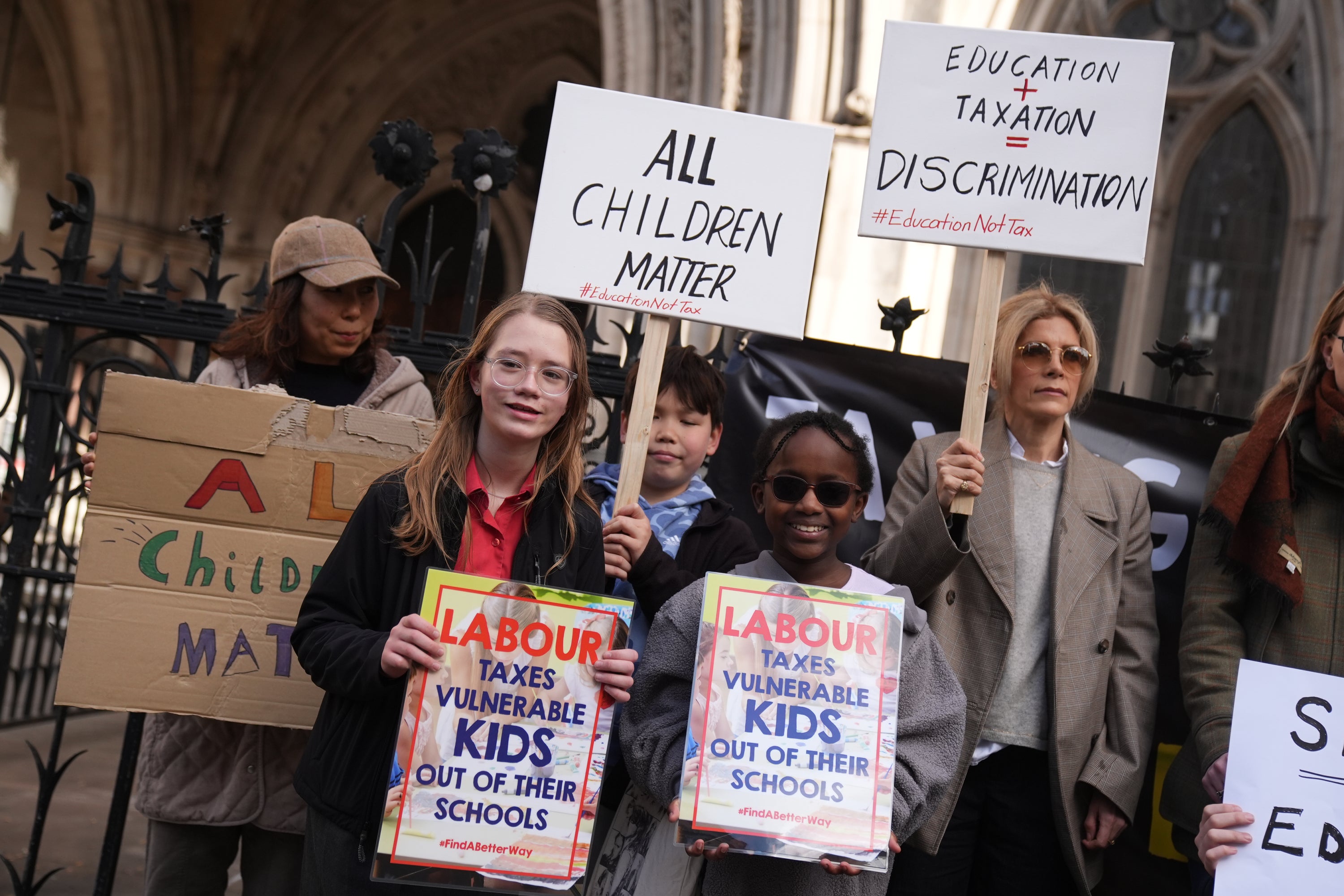
Parents have said they are working seven day weeks to pay for private schools that support their children’s special educational needs as they challenge the government’s tax on fees.
Families gathered at the Royal Courts of Justice ahead of a High Court hearing on Tuesday to challenge the government’s decisions to impose 20 per cent VAT on private school costs.
Nearly 20 families and several faith schools were part of the effort to bring legal action against the Treasury, as they claimed the new VAT on fees is discriminatory and a breach of human rights law.
The Education Not Taxation campaign argues that Special educational needs and disability (SEND) children have been disproportionately affected by this tax hike.
One mother, Leanne Gunn, said she’ll be forced to work all her life in order to afford her son Charlie’s fees, adding: “there is no other option for him.”
The self-employed accountant’s son was diagnosed at age two with transverse myelitis, a rare neurological condition caused by inflammation to the spinal cord, which means he uses a wheelchair and experiences sensory problems such as hearing loss.

Ms Gunn has said her son couldn’t access education in a larger class size and is “flourishing” at his school. Already, she starts work at 5am and doesn’t finish until just before midnight in order to pay the fees.
She said the education tax “just means that I'm gonna be working seven days a week until forever.
“I work really long hours as it is and for Charlie, there is no other option for him. We don't have another state option”, she continued.
Ms Gunn’s working hours have already taken a toll on their relationship.
“I spend very little time with him. I'm always working and he's always complaining to me about how much I work, but I have no choice. That is just the position we're in.”
Education Not Taxation’s spokesperson Loveena Tandon said: “We are deeply grateful to the many families who stood with us today, showing their unwavering support as the High Court hears the case against Labour’s Education Tax.

“It is a shame that parents, schools, and children have had to turn to the courts to address the harms this policy is causing. Parents are making difficult choices to pay Labour’s tax and keep their children in their schools.”
The High Court heard on Tuesday that at least 35,000 children with SEN could be displaced from private schools and into state institutions because of increased costs.
Jeremy Hyam KC, representing two children with SEN in private schools, said in written submissions: “That displacement will have a particularly prejudicial impact for displaced SEN children compared with those entering the state sector who do not have SEN.”
He said that provision for SEN pupils in the state system “is in crisis” and those displaced “will be going into a system which either will not meet, or is highly unlikely to meet, their needs, as compared to the needs of those without SEN in the same situation.”
Sir James Eadie KC, representing the Treasury, HMRC and the DfE, responded that abolishing the VAT exemption for private school fees was expected to yield between £1.5 and £1.7 billion per year.
He continued in written submissions that while parents were welcome to opt out of the “universally accessible” state education system, the measures that affect the cost of providing private education services, and therefore its purchase price, don’t make the measures an interference with freedom to offer or receive private education.
Mother-of-two Dagmara told The Independent that her husband works seven days a week in order to pay for their son’s private school, after they moved him out of their local state primary school last year.
“He works on Saturdays and Sundays”, she said. “It’s just very frustrating, really heartbreaking because we as a family do everything we can to keep him happy. We’ve tried everything.”
Dagmara found that she was having to take her eight-year-old son out of state school most days around 11:30 am, meaning he wasn’t getting a whole day at school.
She said the school repeated on a daily basis “they don’t have the resources” to take care of his needs.

Since moving schools, she said her son is “very happy.”
“His academics definitely improved, but it's all about pastoral care and he seems to be very happy.”
A survey conducted by Education Not Taxation of 2,279 parents with SEND children found that 46 per cent were now ‘likely’ or ‘very likely’ to take their children out of the independent sector in the coming years.
More than 98 per cent of those likely to leave said they did not believe the state school local to them would meet their children’s needs properly.
Labour promised to “end the VAT exemption and business rates relief for private schools to invest in our state schools” in its 2024 general election manifesto.
A government spokesperson said: “We do not comment on ongoing litigation matters.”







